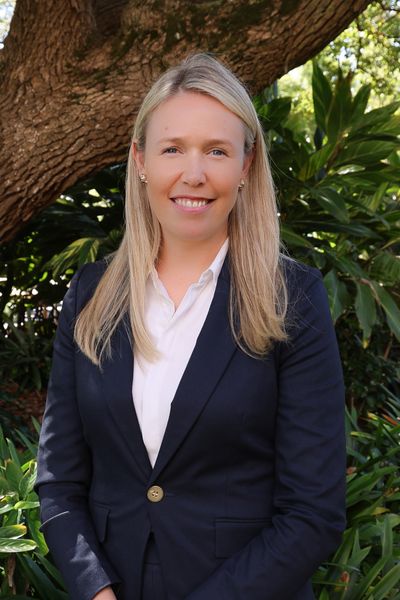“The reality is that every single job can expect to change in some respect in the immediate and long-term future.”— Mrs Crystal Hede

In education, some things will never change. Students will thrive in environments that nurture human connections.
They will invariably be inspired by effective teaching and the satisfaction of personal achievement will always be motivating. At Toowoomba Grammar School, the power of high-quality instructional practices has resulted in the development of a strong academic culture that has endured for nearly 150 years. Preserving core principles provides stability and continuity. However, we must be open to continuously adapting our methods so that our students are well-prepared for the ever-changing world they will navigate. As put by CSIRO CEO, Dr Larry Marshall, “Australia is at a pivotal point. There is a tidal wave of disruption on the way, and it’s critical we take steps now to get ahead of it” (CSIRO, 2022).
Several megatrends identified by the CSIRO are set to shape future society. Technological advancement, particularly the rise of machine learning and the Internet of Things (IoT), will drive augmented and autonomous intelligence across many industries and blur the lines between physical and digital. A global focus on environmental sustainability is predicted to drive industrial change. Global geopolitical shifts will occur for stability and economic growth. Lastly, demographic change, particularly an ageing and more urbanised population, will create new needs. In relation to demographic change, Jobs and Skills Australia projects that across all industries, the greatest growth is expected in health care and social assistance, with its share of total employment reaching 16.7% by 2033 (Jobs and Skills Australia, n.d.).
These megatrends will have far-reaching implications for the workforce. According to the World Economic Forum (2023), 44% of workers’ core skills are expected to change by 2027. Incredibly, the Business Council of Australia estimates that 5–10% of jobs could be entirely substituted by technology over the next decade. Technological change will also generate jobs. The field of robotics, for example, has seen a sudden demand for automation specialists, robotics law specialists, robotics ethicists, trainers, educators and job re-design specialists tasked with developing new roles and skill sets for jobs with increased automation (International Federation of Robotics, 2024). It is important to consider that the above-mentioned jobs will be industry-agnostic and relevant to agriculture, sport, finance, retail trade and more.
Looking forward allows us to reflect on the gap that exists between where our students are now and where they will need to be. In his 2019 book Teaching for Tomorrow, renowned futurist and educator Michael McQueen identifies four capabilities that will be critical for individuals to succeed and thrive in future society. At TGS, we are aware of these projected “capability gaps” and are taking steps to address them in the following ways.

First, we know that students will require self-direction to cope with rapid technological and job change, especially in a booming gig economy. As such, we are positioning our students as lifelong knowledge seekers who can adapt their skill sets to stay ahead.
Second, we know that an increasingly competitive job market and pressure to continually master new skills will require tenacity. Consequently, we continually look to create opportunities for our students to deal with perceived failure and develop grit, resilience and optimism in the process. Third, we understand that the rise of artificial intelligence will result in competing organisations having access to the same information. Originality and creativity will, therefore, become highly sought-after skills, further solidifying their importance in our educational program. Lastly, a world of automation and information abundance will require individuals who can think ethically and with acuity. That is, to discern truth and identify biases. The TGS curriculum continues to place value on this higher-level thinking.
We know that developing all these skills requires a broad knowledge base, and this underpins our pedagogical approach of Explicit Direct Instruction within a knowledge-rich curriculum. Giving our boys deep and relevant background knowledge will develop their acuity to solve complex problems and to think critically and creatively in the future (AERO, 2024). Parents can be assured that we are building an educational program that is suitably responsive to future needs.
Additionally, we continue to explore ways of developing our students’ technological capacity. Our forthcoming Design, Engineering and Technology Centre exemplifies our commitment to this cause. Boys will gain further opportunities to automate workflows, use cloud-based solutions and engineer prototypes, for example. From virtual reality to robotics labs, there will be boundless potential for innovation, not to mention the opportunities that the Agriculture and Industry Centre will also offer. Importantly, these planned spaces will connect our boys with industry and the broader community to foster authentic learning.
In partnership with parents, we can equip TGS boys with the skills and dispositions needed to thrive in this ever-evolving world.

References
Australian Education Research Organisation. (2024, March). A knowledge-rich approach to curriculum design. Australian Education Research Organisation. https://www.edresearch.edu.au/sites/default/files/2024-02/knowledge-rich-approach-curriculum-design-aa.pdf
CSIRO. (2022). Our Future World. CSIRO. Retrieved May 05, 2024, from https://www.csiro.au/en/research/technology-space/data/our-future-world
Jobs and Skills Australia. (n.d.). Employment projections for the decade ahead. Jobs and Skills Australia. Retrieved May 01, 2024, from https://www.jobsandskills.gov.au/publications/towards-national-jobs-and-skills-roadmap-summary/employment-projections-for-the-decade-ahead
McQueen, M. (2019). Teaching for Tomorrow: A Blueprint for Future-Proofing Our Schools, Students and Educational System. The Nexgen Group Pty Ltd.
The World Economic Forum. (2023, May 1). Future of jobs: These are the most in-demand skills in 2023 - and beyond. The World Economic Forum. Retrieved May 02, 2024, from https://www.weforum.org/agenda/2023/05/future-of-jobs-2023-skills/
Latest Blog
The Learning Pit
Learning is at our core and covers all subject disciplines, co-curricular pursuits, personal development and interest areas. Helping our Toowoomba Grammar School boys view learning as a disposition that goes well beyond the classroom context is incredibly important. Learning has a life-long value in all we do. We also acknowledge that learning can be challenging at times, and it can be uncomfortable, but also wonderfully inspiring and fulfilling. Appreciating the full range of feelings and…
Leap Before You Look
The boarding journey offers students a plethora of opportunities to step outside of their comfort zone and take advantage of new environments, relationships, and opportunities during their time at Toowoomba Grammar School. We often talk about “character education” – a theory that originated in the US and has been increasingly embraced by leading schools globally. It is encouraging all students to develop new approaches to their learning, including aspects of morals and ethics, thinking,…
Literacy at TGS: A research-informed approach
A recent Grattan Institute report has shared that one-third of Australian students are failing to learn to read proficiently, referring to the situation as a ‘preventable tragedy’. In addition, the report identifies evidence-based approaches utilising structured literacy programs with phonics and explicit instruction as the most effective methods of teaching literacy. At Toowoomba Grammar School, we implement a structured synthetic phonics approach to teaching spelling and reading that…
Past Mothers, Present Supporters
Any Old Boy will tell you the Blue and Gold is part of their blood. They love the history, the traditions, the memories, and the lifelong friends they made during their time at Toowoomba Grammar School. Well, it seems the same can be said for many TGS mums. The Past Mothers’ Group was formed in 1979 by Mrs Mary Campbell who contacted as many past mothers as she could and invited them to meet at her home where the Past Mothers’ Group was officially formed with the intention of retaining links…
The TGS Interact Club - the Reward for Work Well Done
The Interact Club successfully raised over $10,000 last year for charities and services on a local, statewide and international scale through the hard work and commitment of its members. With these funds, the Interact Club has donated Backpack Blankets to Toowoomba's homeless, helped AEIOU's efforts in supporting children with autism, contributed to the "Are You Bogged Mate?" campaign for rural mental health and raised funds for the Royal Flying Doctor Service. As well as many other individual…
A Question of Character
In an age bursting with technological innovations and an overwhelming abundance of information, the present era appears to be characterised by a swift and unrelenting pace of change. Our society, young and old alike, finds itself constantly bombarded with provocative and sensationalist narratives. The media floods our consciousness with constant streams of global dilemmas, highlighting the flaws of our leaders, uncovering corporate or political scandals, and bringing conflicts and tragedies…
Coping with Homesickness
Homesickness can be brutal for both your son and for parents. As a parent it can feel like your heart is being ripped out in some cases daily. It is extremely hard hearing how sad your boy may sound on the phone, and then you are left reeling for 24 hours until the next call – you are often left worried that they are feeling like this all day. Rest assured only vary rare cases are that bad and in most cases it’s temporary and things usually improve as your son settles in. The reality is that…
Introducing Gabe Robbie, the new Head of Curriculum
I am excited to be joining the staff here at Toowoomba Grammar School in the role of Head of Curriculum. I grew up in a small coastal town in NSW and attended the University of Sydney to complete my undergraduate degree. Please don’t hold my NSW origin against me (Go Blues!). Teaching, and education, has always been a passion of mine and ever since I was in high school, the plan was to be a teacher. I graduated from the University of Sydney with a double degree in Education and Arts, majoring…
What Old Boys Have Contributed to TGS Over Time
The Old Boys’ Association has played an integral role in the history and tradition of Toowoomba Grammar School. It was formed on December 29, 1888, when 25 Toowoomba Grammar School Old Boys met at Long’s Imperial Hotel to create a new society. The Toowoomba Grammar School Old Boys’ Association rules were drawn up, and office-bearers elected. The inaugural president was Mr Joesph Vincent Herbert Esq. (TGS 1877-80) From there, the TGSOBA has grown significantly, ensuring that the Blue and Gold…